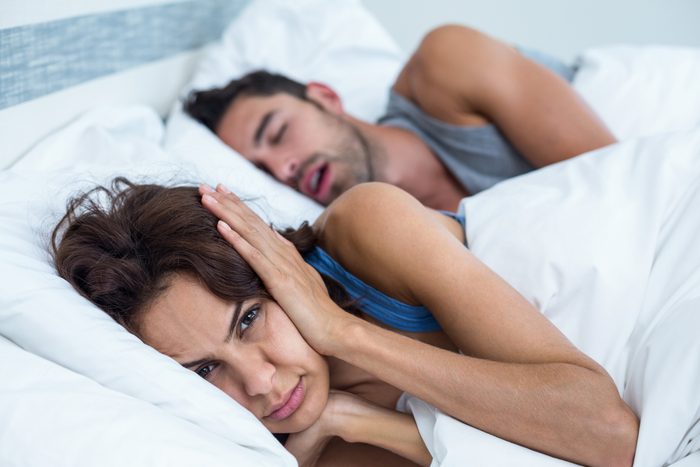Here’s the Best Position to Sleep in If You Snore, Says a Sleep Doctor
Updated: Jul. 18, 2022

It's natural to think snoring is a result of what's happening in the nose and the nasal passage, but a Stanford sleep medicine doctor says another issue should concern some snorers most.
Unfortunately, a loud snore is the symptom of a greater problem
For the upwards of 90 million Americans who suffer from snoring at night (according to the Yale School of Medicine), the Internet seems to offer a myriad of solutions. Losing weight, changing your sleep position, avoiding alcohol, and adopting a sleep hygiene routine are all documented as remedies for snoring.
And while these points do help with sleep and snoring somewhat, none of them are the ultimate solution for snoring at night. According to Scott Kutscher, MD, a clinical associate professor who focuses on sleep medicine at Stanford University, the best solution for snoring loudly is to talk with a doctor about sleep apnea.
Considering a “Sleep Divorce”? First, Try These 4 Anti-Snoring Products
What is sleep apnea?
Sleep apnea is a disorder that causes breathing to repeatedly stop and start, which can result in a loud snore at night. Obstructive sleep apnea is the most common, which happens when the throat muscles relax. While one obvious result of sleep apnea is feeling tired the next day, Dr. Kutscher mentions ways in which this disorder can even affect your long-term health.
“Sleep apnea should be addressed as a health problem,” says Dr. Kutscher. “Untreated sleep apnea is a health risk that increases the risk for things like high blood pressure, cardiovascular disease, [and] irregular heart rhythms like atrial fibrillation.”
Past studies have also suggested there may be a significant link between sleep apnea and a broader range of health problems, like obesity, anxiety and depression. So, that interrupted sleep may have implications on one’s overall wellness beyond just feeling beat in the morning.
Get The Healthy @Reader’s Digest newsletter
Why snoring is a major indicator of sleep apnea
“Snoring is representative of upper airway collapse, which is what we call an ‘apnea’,” says Dr. Kutscher. “When that happens repeatedly through the night, that can decrease your oxygen, which can cause awakenings during sleep. That problem can lead to fatigue, unrestful sleep and sleepiness during the day. Or even subtler things, like difficulty with focus or concentration, and irritability.”
Most people commonly think snoring is a result of what’s happening in the nose and the nasal passage, but Dr. Kutscher says the collapse of the upper airway (the back of the throat) is what should be most concerning.
16 Things Sleep Doctors Wish You Knew About Snoring
“We find people tend to downplay it, or people have been aware of their snoring for a long time until they finally go see a sleep doctor which is okay,” Dr. Kutscher continues. “If you’re worried about snoring, or if people have told you about your snoring, it’s something to bring up first and foremost with your doctor.”
A solution for sleep apnea
While Dr. Kutscher makes it clear that there isn’t a full-on solution for eliminating sleep apnea, one of the most common treatments is using a continuous positive airway pressure (CPAP) machine.
Dr. Kutscher also recommends some solutions to clear up the nasal passage—like over-the-counter saline sprays and steroids, nasal strips, or nasal dilators. He recommends sleeping on your side or with your head elevated rather than on your back so gravity doesn’t push the airway down and closes it.
“Again, these are all mild interventions, and if you have sleep apnea these really aren’t going to fix the problem,” says Dr. Kutscher. “The only way to know if you have sleep apnea is to get tested.”
The Best Sleep Doctor in Every State
Sleep hygiene can also benefit your rest
While a sleep apnea diagnosis and treatment is Dr. Kutscher’s recommendation for snoring loud at night, following a sleep hygiene routine can also assist with having better quality sleep at night. Dr. Kutscher says avoiding overstimulating activities on your screens can decrease your stress levels, as well as using blue-light blocking apps or glasses with your devices so your melatonin levels won’t deplete, which will benefit your natural circadian rhythm and lead to a better night’s rest.
Nate Berkus Just Shared His #1 Best Design Secret for a Better Night’s Sleep
For more wellness insights, follow The Healthy on Facebook, Instagram, and Twitter. Keep reading:














